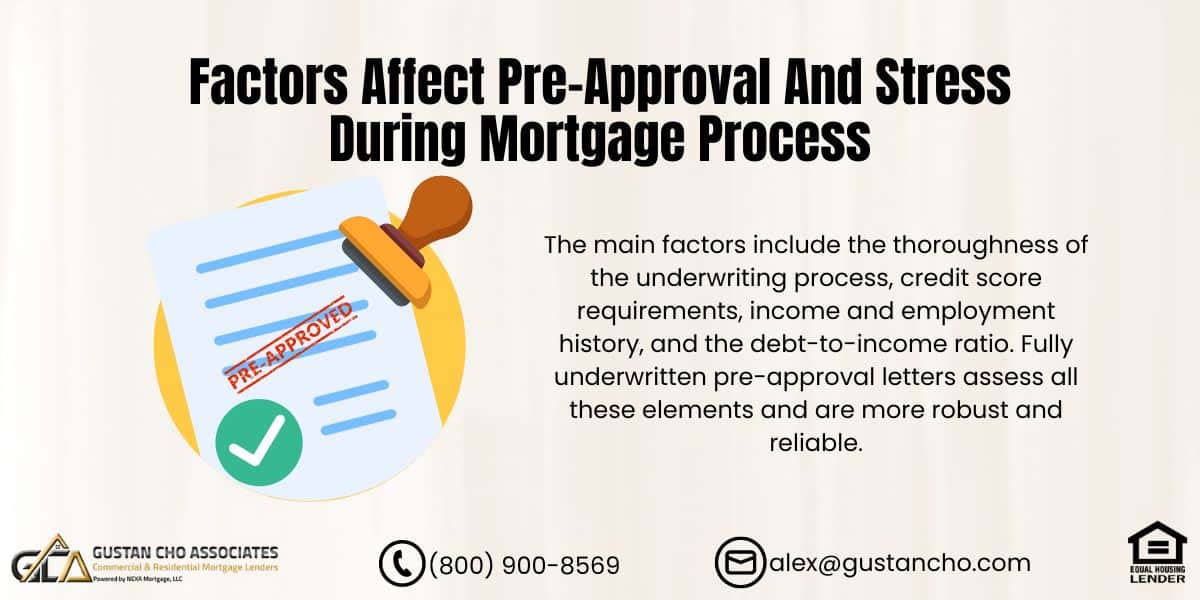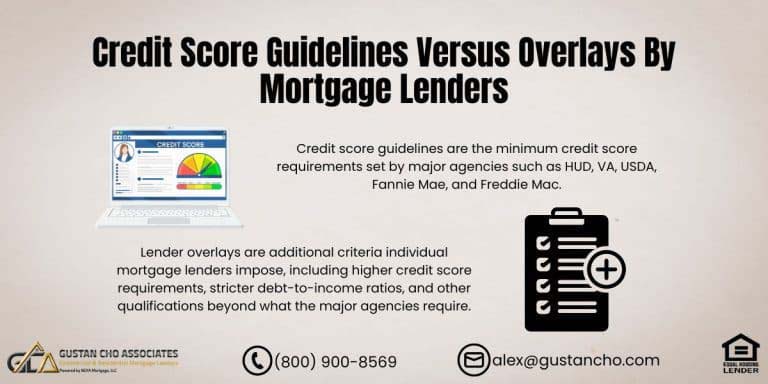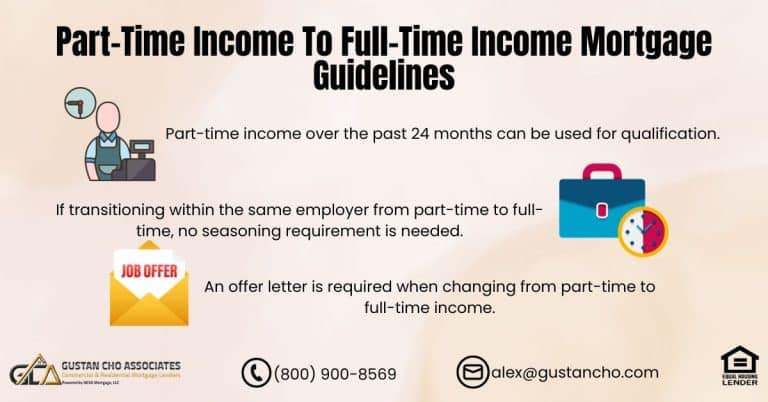This article explores the Factors Affect Pre-Approval And Stress During Mortgage Process.
Once individuals decide to purchase a home, the subsequent step is qualifying for a home loan. Prospective buyers must assess the required down payment and closing costs and determine their eligibility for a loan. Homebuyers must undergo the qualification process and obtain a pre-approval letter before commencing their home search.
With a solid pre-approval letter, sellers and their realtors will likely show properties to prospective buyers. Moreover, pre-qualification letters are no longer widely accepted in the market and are gradually becoming obsolete. Consequently, many mortgage lenders have ceased issuing pre-qualification letters as they need to gain more weight in the current landscape.
Factors Affecting Pre-Approval for Mortgage Loans
Applicants must meet specific minimum credit score criteria to qualify for different mortgage loan programs. For instance, a home buyer aiming for a 3.5% down FHA loan must have at least a 580 credit score. Conversely, a conventional loan requires a minimum credit score of 620.
Credit History Considerations
Merely achieving the required credit score does not guarantee mortgage loan approval. Lenders also thoroughly examine the borrower’s credit report, focusing on their overall payment history. Lenders must observe no instances of late payments within the last year. Lenders enforce specific waiting periods following bankruptcy or foreclosure, and late payments post-bankruptcy or foreclosure are particularly detrimental.
These factors remain critical in the evaluation process regardless of bankruptcy or foreclosure age. Before issuing a pre-qualification letter, the mortgage loan originator will assess potential borrowers’ credit scores and detailed credit reports.
Credit History Of Borrowers
While achieving the minimum credit score threshold is necessary, it does not guarantee mortgage loan approval.Key factors that affect pre-approval include a thorough examination of the credit report and the borrower’s payment history by the mortgage lender.
Specifically, lenders look for a clean record of on-time payments in the previous 12 months. Lenders enforce a mandatory waiting period following any bankruptcy or foreclosure, and any late payments occurring after these events are particularly detrimental. These criteria apply regardless of the age of the bankruptcy or foreclosure.
Before issuing a pre-qualification letter, the mortgage loan originator evaluates potential borrowers’ credit scores and credit reports.
Ready to Buy a Home? Get Pre-Approved and Reduce Stress Throughout the Mortgage Process!
Contact us today to get pre-approved and take the first step toward stress-free home buying.
Income And Employment History
Income is probably the most important factor in determining the amount of mortgage loan home buyers qualify for.
Self-employed individuals or those earning through 1099 must submit two years of tax returns. The mortgage loan originator must assess these returns before issuing a pre-qualification letter.
Calculating income for self-employed and 1099 wage earners is complex and could influence Factors Affecting Pre-Approval. It requires detailed examination because many self-employed individuals and 1099 earners report significant unreimbursed expenses, which reduce their adjusted gross income, potentially impacting Factors Affect Pre-Approval.
Additionally, itemized deductions like depreciation can be reinstated to the income, enhancing the adjusted gross income and positively affecting Factors Affect Pre-Approval. Conversely, income from part-time work, bonuses, and overtime will only be considered if the borrower has received it consistently over the past two years.
Incomes such as child support, disability, royalty, social security, and pension are also eligible for consideration in mortgage applications. However, income from child support, alimony, disability, and royalties must be expected to continue for at least the next three years for it to be considered.
Mandatory Requirement Factors Affect Pre-Approval
A two-year employment history is required for borrowers seeking pre-approval. However, this history does not need to be continuous or require employment with the same employer throughout those two years. Employment gaps are permissible under these guidelines.
For borrowers who have been unemployed for six months or less:
- If they have recently secured a new full-time position, the income from this job will be considered in the income calculations for mortgage qualification.
- Borrowers must present paycheck stubs from the last 30 days to prove their employment when closing to be eligible for a mortgage loan.
For borrowers who have been unemployed for six months or more:
- They must have been employed in their new full-time job for at least six months to qualify for a mortgage loan.
- A verification of employment letter is required.
- There must be a reasonable expectation that the employment will continue for at least three years.
Factors Affect Pre-Approval: Third-Party Fees And Charges
In the context of mortgage loan pre-approval, understanding third-party fees and charges is essential. These costs, incurred from external services necessary for completing the home purchase and mortgage process, can significantly impact your pre-approval status and the overall affordability of the property. Here’s a more detailed look at each type:
- Title Charges: The fees for examining public records confirm that the seller can transfer ownership and uncover any claims, errors, or other issues related to the property’s title.
- Recording Fees: Paid to a government body, recording fees cover the cost of entering the official records of the real estate transaction and the change of ownership.
- Appraisal Fees: This fee is paid to an appraisal professional to assess the property’s fair market value. The lender must ensure that the property is worth the loan amount.
- Attorney Fees: Legal professionals charge these fees for preparing and reviewing the documents necessary for the real estate transaction and ensuring legal compliance.
- Additional Costs and Fees: Certain expenses are associated with buying a home and securing a mortgage, such as inspection fees, credit report fees, and other miscellaneous expenses. These costs are significant because they impact the loan amount and the terms that the lender offers to the borrower.
Each of these fees contributes to the total cost of purchasing a home and can affect the borrower’s ability to secure pre-approval for a mortgage by impacting the overall financial assessment.
Feeling Stressed About the Mortgage Process? Get Pre-Approved for Peace of Mind!
Reach out now to get pre-approved and set yourself up for success.
Factors Affect Pre-Approval: Sellers Concessions And Lenders Credit
Many homebuyers generally don’t need to concern themselves with closing costs.
A homebuyer may receive a seller’s concession to help cover their closing costs. Typically, sellers are willing to provide such concessions to buyers. For FHA and USDA loans, the maximum seller’s concession allowed for a buyer’s closing costs is 6%. In contrast, the maximum seller’s concession for conventional loans is 3% for owner-occupied homes and 2% for investment properties. Additionally, VA loans permit up to a 4% seller’s concession.
These concessions are crucial factors affecting pre-approval, directly impacting the affordability and upfront costs a buyer needs to manage.
Home Buyers who need to qualify for a mortgage with a direct lender with no overlays, please contact Gustan Cho Associates at 800-900-8569 or text us for a faster response. Or email us at gcho@gustancho.com. We are available 7 days a week, evenings, weekends, and holidays.
Must Meet Debt To Income Ratios
Even with excellent credit and a strong income, borrowers may still need help in obtaining loan pre-approval if their monthly debt obligations are too high. This can result in a debt-to-income (DTI) ratio that surpasses the required limits.
For an FHA loan, the permissible maximum DTI ratios are 46.9% on the front end and 56.9% on the back end, as determined by the Automated Underwriting System’s approval for an approve/eligible status. In contrast, the maximum DTI for a conventional loan is set at 50%.
The debt-to-income ratio is determined by totaling all minimum monthly debt payments, including the anticipated new housing payment, and dividing this sum by the borrower’s total monthly gross income.
Should a borrower’s DTI ratio exceed these thresholds, various strategies are available to reduce the DTI to align with the necessary guidelines.
Tips And Advice In Lowering Debt To Income Ratios
Here are several factors that affect pre-approval when trying to qualify for a mortgage loan by reducing your debt-to-income ratio:
- Paying down credit card balances
- Paying off specific credit obligations
- Securing a non-occupant co-borrower
The Federal Housing Administration (FHA) permits a homebuyer to include a non-occupant co-borrower to supplement their income for qualification purposes. However, this co-borrower must be a relative or family member.
It’s important to note that while the non-occupant co-borrower will be included on the mortgage note, they will not be listed on the property title.
Down Payment And Closing Costs
Before issuing a pre-qualification letter, a mortgage loan originator must verify the sources of down payment and closing costs. The loan officer will inquire about the borrower’s current bank balances and assess various asset details, which include:
- Investment accounts
- Retirement accounts
- Other liquid assets
The requirements for a down payment can differ based on the mortgage loan program selected. Additionally, closing costs can vary by county.
Gift Funds For Down Payment
For home buyers lacking personal funds for a down payment, HUD permits a family member to provide the entire amount as a gift. However, these gifted funds must not be repayable and cannot be taken out as a loan. Additionally, both the home buyer and the donor must sign and date a gift letter confirming the nature of the funds.
Pre-Approval by Mortgage Underwriters
Key factors affecting pre-approval include whether the pre-approval is fully underwritten and endorsed by a mortgage underwriter instead of merely being approved by a loan officer. A robust pre-approval letter should be fully underwritten and signed by a mortgage underwriter. While loan officers can issue pre-qualification letters, they are not authorized to issue pre-approvals.
A pre-approval letter is a formal document a mortgage lender provides that confirms a borrower’s approval for a home loan. This letter verifies that the lender has assessed the borrower’s loan application, credit history, and income and has determined that they meet the mortgage criteria. The letter specifies key details such as the loan amount, required down payment, interest rate, and loan type.
The primary cause of last-minute mortgage denials or significant stress during the mortgage process is often due to borrowers needing to be properly pre-approved.
At Gustan Cho Associates Mortgage Group, all pre-approvals are thoroughly underwritten and signed off by our mortgage underwriters, ensuring accuracy and reliability.
Stress-Free Home Buying Starts with Pre-Approval—Let’s Get You Approved Today!
Contact us now to get pre-approved and avoid the common stresses of the mortgage process.
Pre-Approval by a Loan Officer
A pre-approval should not be issued in a matter of minutes by a loan officer.
A mortgage loan originator might use Fannie Mae’s Automated Underwriting System to evaluate the mortgage application and credit report, checking if the applicant qualifies for an approved/eligible status based on DU FINDINGS. It is common for mortgage loan originators to utilize DU when dealing with applicants who have poor credit, low credit scores, or high debt-to-income ratios.
The approval status of approve/eligible per DU FINDINGS is highly influential. Some lenders do not impose additional requirements beyond what the DU FINDINGS suggest and will base their decision solely on this evaluation. Approve/eligible status is considered final approval, provided borrowers meet all conditions specified in the automated approval report. Several factors influence the pre-qualification process.
At Gustan Cho Associates Mortgage Group, our mortgage underwriters meticulously issue a pre-approval letter after full underwriting rather than merely by loan officers.
FAQ About Factors Affect Pre-Approval And Stress During Mortgage Process
- 1. What is the significance of a pre-approval letter in the home-buying process? A pre-approval letter is essential as it confirms that a borrower has been evaluated and approved by a lender to obtain a mortgage. This letter enhances credibility with sellers and realtors, indicating that the buyer is serious and financially capable.
- 2. Why are pre-qualification letters becoming obsolete? Pre-qualification letters are gradually losing relevance in the market because they offer a less thorough assessment of a borrower’s financial status than pre-approval letters. Many lenders have stopped issuing them as they carry less weight in securing a home purchase.
- 3. What are the key factors affecting pre-approval for a mortgage loan? The main factors include the thoroughness of the underwriting process, credit score requirements, income and employment history, and the debt-to-income ratio. Fully underwritten pre-approval letters assess all these elements and are more robust and reliable.
- 4. How does one’s credit history impact mortgage loan approval? Lenders meticulously examine a borrower’s credit report, focusing on payment history and specific events like bankruptcy or foreclosure. A clean record of on-time payments for at least the past year is crucial, and any late payments post-bankruptcy or foreclosure can be particularly detrimental.
- 5. What is considered when calculating a borrower’s income for a mortgage? For self-employed individuals or 1099 earners, lenders require a detailed look at the past two years of tax returns. They consider regular income, bonuses, and other consistent payments over the past two years. For qualification purposes, income from sources like child support or social security must be expected to continue for at least three years.
- 6. What is the importance of debt-to-income ratios in mortgage approvals? The debt-to-income ratio, the sum of all monthly debt payments divided by gross monthly income, must not exceed certain thresholds specified by loan type (FHA, conventional). Exceeding these limits can hinder loan approval, but strategies such as paying down debts can help align with required ratios.
- 7. Can a homebuyer include a non-occupant co-borrower? Yes, the FHA allows a non-occupant co-borrower to be included on the mortgage note to help meet income qualifications for the loan. This co-borrower must be a relative or family member but will not be listed on the property title.
- 8. How do down payment and closing costs affect mortgage pre-approval? A loan officer must verify sources of down payment and closing costs before issuing a pre-qualification letter. These costs, along with the required down payment, vary by mortgage program and can impact the overall affordability of the loan.
- 9. What are third-party fees, and how do they influence pre-approval? Third-party fees include charges for services like title checks, recording, appraisals, and legal counsel that are necessary to complete the mortgage process. These fees contribute to the total cost of purchasing a home. They can affect a borrower’s financial assessment during pre-approval.
- 10. How can gift funds be used in the mortgage process? HUD allows homebuyers to use gift funds from family members for down payments. These funds must be a genuine gift, not repayable, and both the donor and recipient must sign a gift letter to confirm the arrangement.
This blog about the Factors Affect Pre-Approval And Stress During Mortgage Process was updated on April 23rd, 2024.
Overwhelmed by the Mortgage Process? Pre-Approval Can Help You Stay Calm and In Control!
Contact us now to start the pre-approval process and reduce your stress during the mortgage journey.










